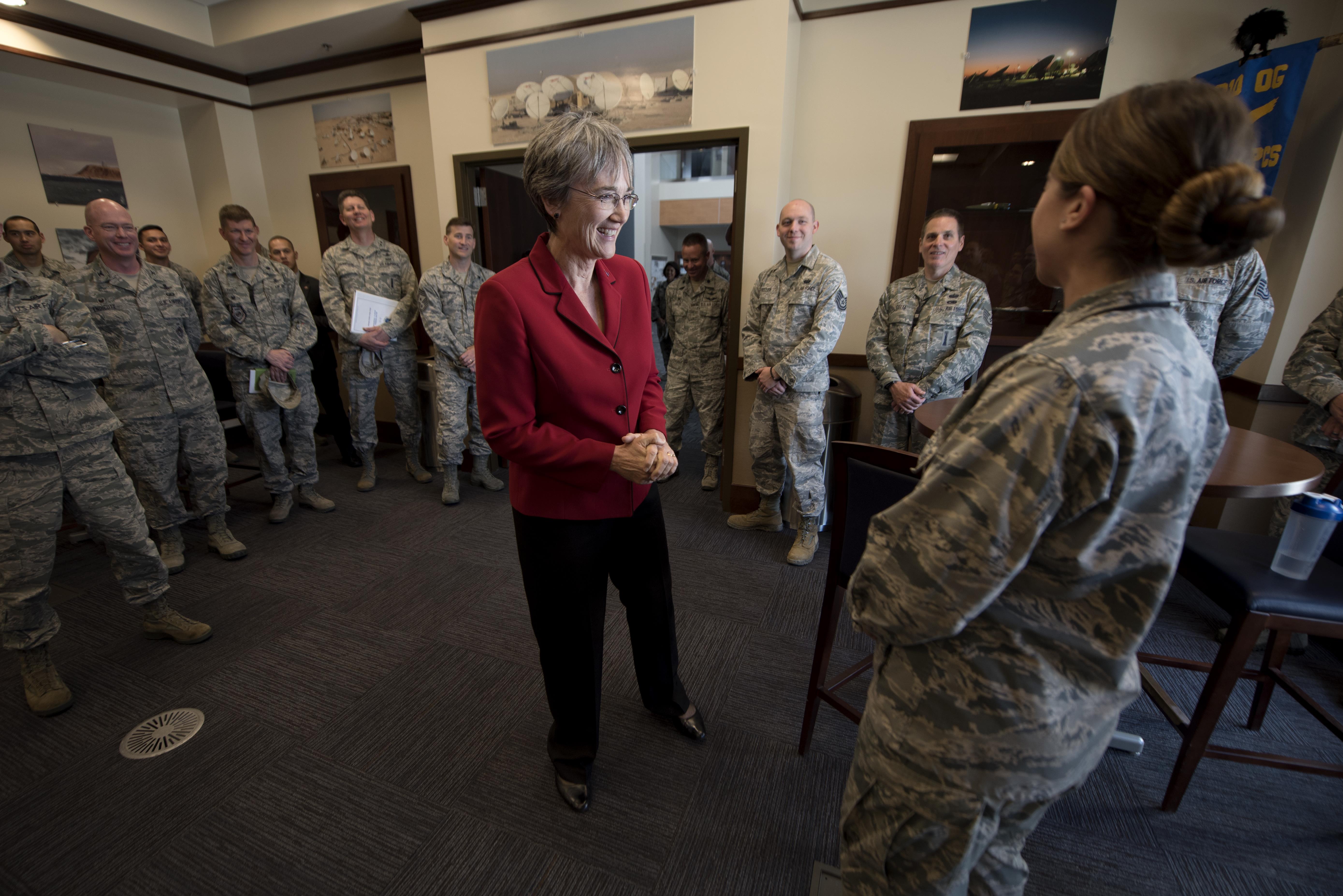Secretary of the Air Force Heather Wilson engages with airmen at the 16th Space Control Squadron during her first base visit as SECAF to Peterson AFB, Colo., May 22, 2017. Wilson spent time meeting airmen assigned to Air Force Space Command's only defensive space control unit. Air Force photo by A1C Dennis Hoffman.
The Air Force wants to be the lead service in US military space operations, but Congress is growing impatient with the service’s efforts to deliver long-promised reforms to unify leadership and streamline acquisitions. The tension may come to a head in this year’s National Defense Authorization Act, which could include policies to fundamentally reorganize the National Security Space enterprise, according to officials speaking at an AFA Mitchell Institute forum on Capitol Hill on Friday.
At issue is the slow pace of funding growth and of acquisition reform.
“Underinvestment in space is a huge problem,” Rep. Doug Lamborn (R-Colo.) said. While the President’s budget request for fiscal year 2018 increases Air Force spending on space by 20 percent, Lamborn complained that, as a share of the total DOD budget, space spending would only grow by one-tenth of one percent. Given the increasing centrality of space functions to joint US combat operations, this sort of growth is “nothing to write home about,” Lamborn said.
This sort of stagnation is what happens, Lamborn asserted, “if no one’s in charge.” His statement echoed the critique of Rep. Mike Rogers (R-Ala.), who has argued that the space enterprise is administratively stunted by the “60 different stakeholders who are involved in decision making about space programs.” In order to fix this problem and put a single service at the helm, Congress directed the DOD, in the 2016 NDAA, to consolidate decision-making authorities for space under the Air Force.
Air Force Secretary Heather Wilson announced Friday morning that DOD has doubled-down on this strategy, for at least another year, by reaffirming the Secretary of the Air Force as the principal DOD space advisor (PDSA). Wilson also said the service is seeking to address Congressional concerns by moving ahead with its plans to stand up a new deputy chief of staff for space operations.
The new three-star position, A-11, will begin at the Pentagon on Aug. 1, said Wilson. That person will be “a strong senior space advocate within the Air Force” who will provide “oversight across Air Force headquarters staff” for space issues. The new position will also help “normalize the requirements process” and serve as “a career manager” for space personnel.
Rep. Jim Bridenstine (R-Okla.) made it clear on Friday that these efforts may not be enough. He admitted that Rogers, who chairs the House Armed Services Committee’s strategic forces subcommittee and has called for the formation of a separate space force within DOD, has “a very aggressive agenda” that not all committee members agree with.
As for himself, Bridenstine said, “the A-11 is an effort to move in the right direction.” But for others on the committee, he acknowledged, “one more person is not the right answer” to the larger problem of space leadership.
That problem is a real one, explained Cristina Chaplain, director of acquisition and sourcing management at the Government Accountability Office. Chaplain has worked on many of the GAO’s reports criticizing space acquisitions for being too slow and too expensive. She said Friday that approval from eight organizations is needed for acquisition authority in space policy, approval from 11 organizations is needed for oversight authority, and approval from six is needed for requirements authority. With a decision-making structure as complex as this, in her estimation, “all roads lead back to leadership fragmentation.”
Todd Harrison, a budget expert and senior fellow at the Center for Strategic and International Studies, agreed and predicted the Congress would act to make changes this year. The DOD desperately needs to align “responsibility for space with authority, and specifically budget authority,” he said. “We don’t have effective, centralized management of the space budget.” In the Air Force, leaders are currently making “heroic efforts” to do their best with what they have, but “a more robust organizational structure” is badly needed.
“Congress will do something this year,” said Harrison, though he is less sanguine about the impact of lawmakers’ efforts. “Personally, I don’t think we’re ready for a solution on this,” he suggested. “Culturally, the Air Force is not ready” for the kind of massive organizational changes being proposed by some in Congress. Chief of Staff Gen. David Goldfein has said as much recently on Capitol Hill.
Instead of a quick move on organizational restructuring, Harrison thinks DOD would benefit from “an independent commission” that would produce a study with recommendations on the problem of space leadership.
In the meantime, Congress may be more ready than the Air Force. “We can’t afford to rearrange the deck chairs,” Lamborn said. “The rest of the committee shares [Rogers’s] concern,” he affirmed, and they seem prepared to shake things up.
